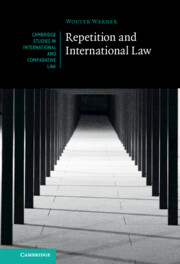Book contents
- Repetition and International Law
- Cambridge Studies in International and Comparative Law: 162
- Repetition and International Law
- Copyright page
- Contents
- Acknowledgments
- Introduction
- 1 The Eternal Return of Not Quite the Same: Repetition and the Sources of International Law
- 2 The Law of Receding Origins: Repetition and the Identification of Customary International Law
- 3 “Once Upon a Time, There Was a Story That Began”: Repetition in Security Council Resolutions
- 4 Say That Again, Please: Repetition in the Tallinn Manual
- 5 Rehearsing Rehearsing: Repetition in International Moot Court Competitions
- 6 The Unimaginable on Screen: Repetition in Documentary Films on Trauma and Atrocities
- The End
- Bibliography
- Index
- Cambridge Studies in International and Comparative Law
2 - The Law of Receding Origins: Repetition and the Identification of Customary International Law
Published online by Cambridge University Press: 20 January 2022
- Repetition and International Law
- Cambridge Studies in International and Comparative Law: 162
- Repetition and International Law
- Copyright page
- Contents
- Acknowledgments
- Introduction
- 1 The Eternal Return of Not Quite the Same: Repetition and the Sources of International Law
- 2 The Law of Receding Origins: Repetition and the Identification of Customary International Law
- 3 “Once Upon a Time, There Was a Story That Began”: Repetition in Security Council Resolutions
- 4 Say That Again, Please: Repetition in the Tallinn Manual
- 5 Rehearsing Rehearsing: Repetition in International Moot Court Competitions
- 6 The Unimaginable on Screen: Repetition in Documentary Films on Trauma and Atrocities
- The End
- Bibliography
- Index
- Cambridge Studies in International and Comparative Law
Summary
Chapter two deals with the impossibility to account for the rise of a rule of customary law. I was once more confronted with this problem when I read the ILC Report on the identification of rules of customary law. The report contains a courageous attempt to develop a methodology to identify such rules in an objective way. However, along the way, many of the age-old problems regarding the existence and rise of rules of customary law reappear. The impossibility of grounding a method for customary law, I argue, has to do with the repetitive nature of this body of law. Rules of customary law only exist in and through restatements that present them as already valid. To get a better grasp of the kind of repetitive logic that drives customary law, I compare it to the logic of repetition at work in Beckett’s Waiting for Godot. In both cases, what is essential is and must remain absent; it is nevertheless made operative through acts of repetition and representations. Yet, customary law is also radically different as it employs what Kierkegaard called "repetition forward," a form of repetition that comes with change and transformation over time.
Keywords
- Type
- Chapter
- Information
- Repetition and International Law , pp. 42 - 71Publisher: Cambridge University PressPrint publication year: 2022

